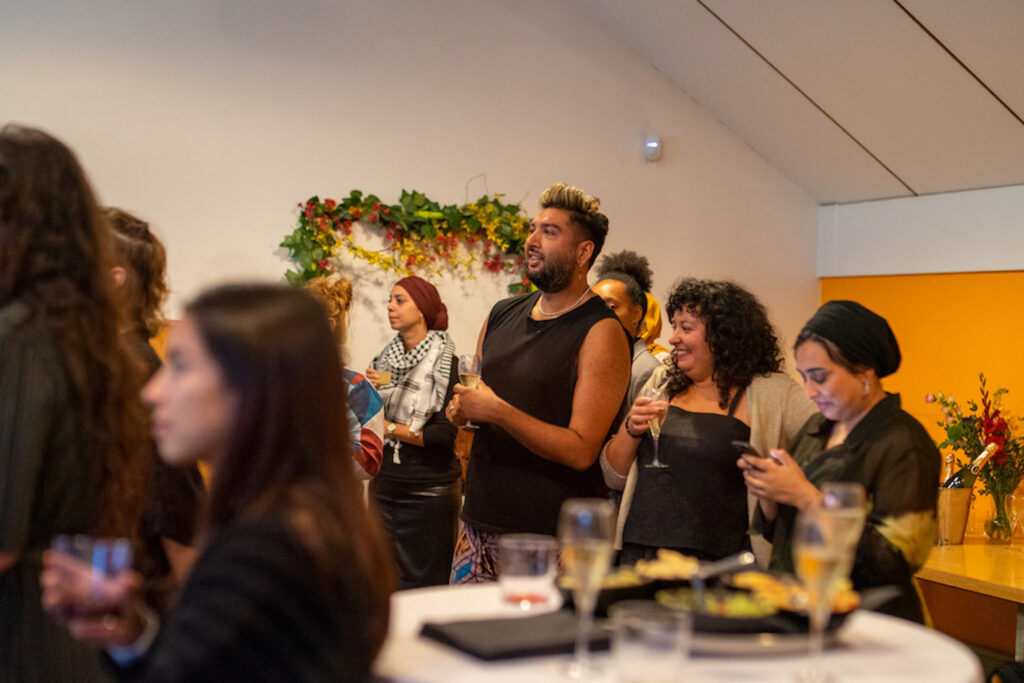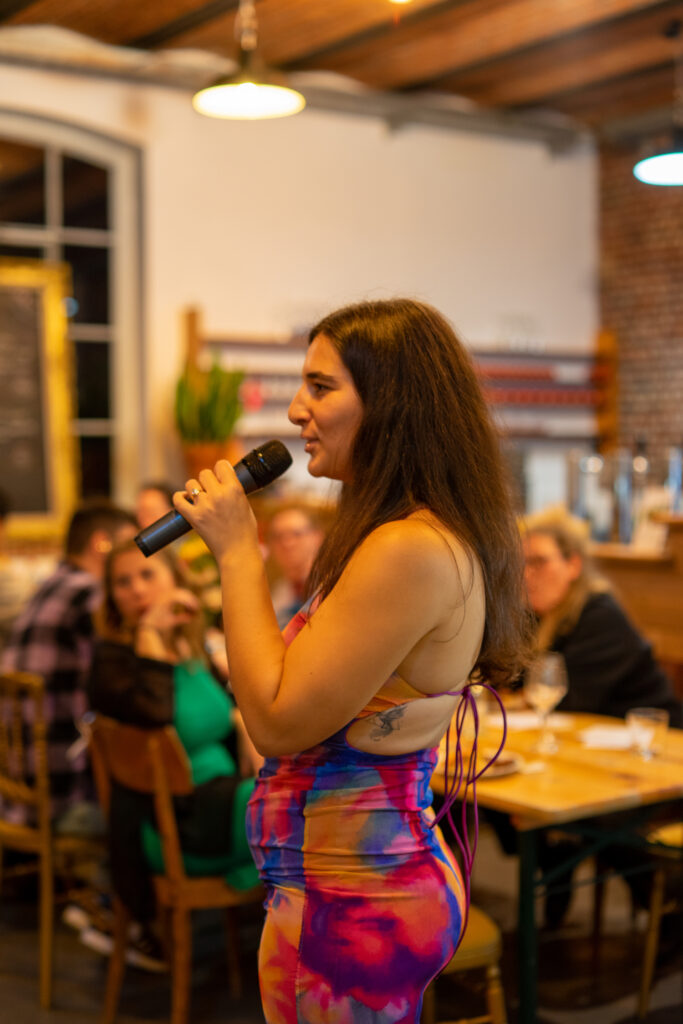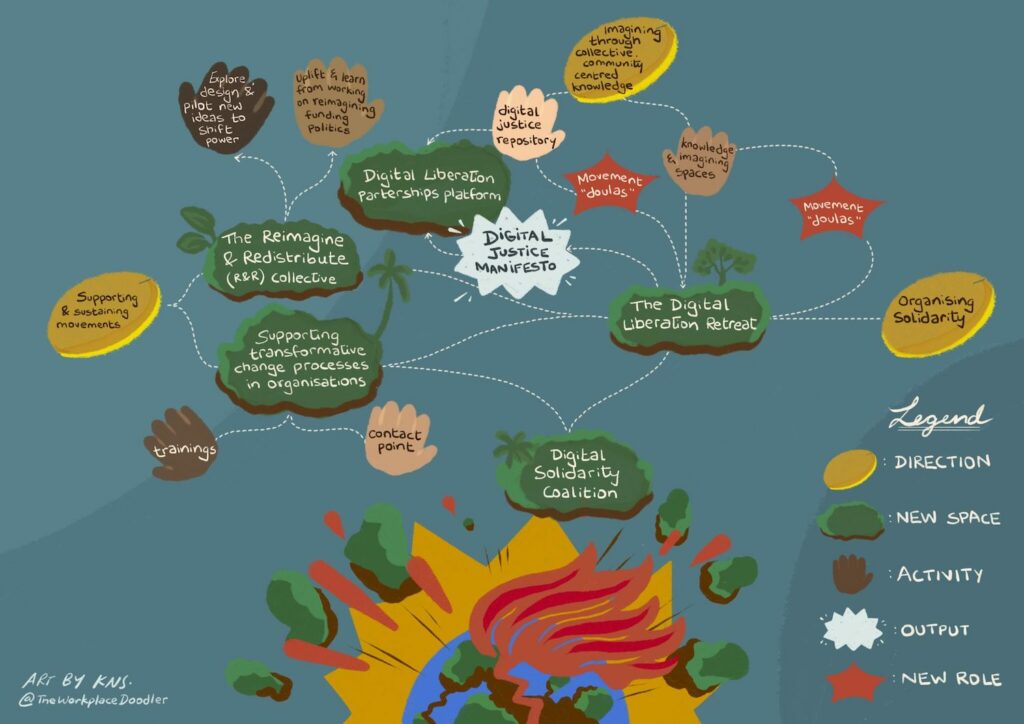
How to throw a wedding for digital justice
This blog speaks to a community celebration, soft launching ‘A Vision for Digital Justice Organising in Europe’, the programme that emerged from the Decolonising the Digital Rights in Europe process. This event was held in Brussels on October 11, 2023, and brought together participants to the process, civil society allies and funders committed to supporting digital justice.
Find a community of radical visionaries in need of celebration
If you’ve been following this blog series, last you heard from us we had finished assembling a draft of the decolonising programme, marking an important milestone in a years-long process of re-imagining the digital rights field. Following a proposition from the participants, we then opened this draft up for feedback, and organised consultations with different groups.
This process, brilliantly led by Salmana Ahmed, was both an exciting and difficult one. Difficult because it exposed us to the constant distraction that Toni Morrison calls ‘the very serious function of racism’. ‘It keeps you from doing your work. It keeps you explaining over and over again, your reason for being.’
It was hard, in practice, to tune out the noise coming from those fearing change and their own loss of domination, and to be faced with overwhelming and violent resistance towards the transformative anticolonial work we were suggesting – in many ways proving over and over again the very foundational premises of the decolonising process. The lack of power analysis within the field means the field remains disconnected from the harm of tech, and keeps approaching issues of digital ‘rights’ in a vacuum, outside of a racial and social justice framework. The resistance also takes the form of bad faith ‘misunderstandings’ of terms, in reality a refusal to acknowledge the reality of colonisation and Europe’s role in it. This type of discourse is accompanied by bigoted undertones that seek to dismiss the work of young Black and Brown women, queers, etc.
Willem Lenders, Limelight Foundation, early participant to the decolonising process: “This work is very important to me working in philanthropy, as we have dictated what technological harms looked like for decades. As a result, we blocked the chance for true digital justice for those affected the hardest. That needs to change.“
Nevertheless, this process also showed us how close we were to enacting change, how palpable this future we collectively imagined is. It also offered a clarifying moment for the field which had to have a discussion about its relationship to social, racial, environmental, disability, transfeminist, movement and economic justice. These consultations spread the solidarity net even wider, and friends and accomplices of the programme, old and new, graciously offered new insights, helped bridge gaps in the programme, tightened the interconnections between our struggles, and showed us where we could use more iteration to resonate with people outside the process.
David Alders, Stiftung Mercator: “As digital technologies permeate most parts of our lives, there is no justice without digital justice. The ways in which digital technologies create new and amplify existing injustices often are opaque. So, as a first step, we need to shed light on them and provide those affected with the means to claim their rights.”
The need for a transition from EDRi and DFF’s leadership towards more collective ownership was mentioned in the last blog. As the programme progressively took shape, participants urged us to think about what type of accountability and resourcing systems could be put in place to ensure the programme is implemented while mitigating the risk of co-optation or tokenism. Hence, in parallel a power-shifting transition plan for the programme’s implementation was further being defined, with a new entity gaining contours as a result. At this point you may be sensing a soft launch and wonder ‘was this a shotgun wedding?’ but suspense is best built over time, so hold on to this series as the pieces start falling into place.
After the consultation period, and some redrafting of the programme to incorporate the valuable feedback from members of the community, a ‘final’ decolonising programme, or one that we were ready to share with the world, emerged! Alongside this, the new entity was becoming more and more concrete.
And so, a mounting desire to celebrate these milestones filled the air, tying together a long and beloved process slowly reaching its ‘end of an era’ moment for the community who carried it through. But, how to throw a party that would do justice to this wonderful group?
Find a group of friends and accomplices eager to support digital justice
We were still ruminating on this question when we heard through the grapevine that digital rights funders were meeting in Brussels in the fall. Now, what’s a community celebration that also inspires wider commitment from those with a vested interest in seeing said community thrive and grow? Indeed, a wedding. In our case, a wedding for digital justice.
Beyond the (excellent) metaphor, the reality is that while digital justice may be priceless, it can only be sustained through radically serious support (including funding), to build on the foundations set forth in this decolonising programme.

This led us to extend the invite to a private soft-launch of the programme to funders who supported the decolonising process, as well as funders who will hopefully be interested in supporting the implementation of the programme in the future. And if this was going to be a wedding, friends of the process would of course be invited, from participants, long-time supporters to accomplices emerging from the consultations phase.
Ife Thompson, BLAM UK: “Digital rights is a racial justice issue. Norms embedded in anti-Black society are being utilised in tech to expand and entrench the subjugation our communities face. This is why I am excited at the launch of Weaving Liberation in centring communities to create a digital space that serves, not harm, our communities.”
Roll with it through thick and thin
Now, planning a wedding is notoriously easy. Planning an event in Brussels in the ‘back-to-school’ months, on short notice, likewise. Walking the decolonising talk under racial capitalism, always a smooth undertaking. We were definitely set up for success.
If at this point you’re stuck wondering ‘who are the brides or grooms or nondenominational wedding pair in this scenario?’, I must caution you against spiralling too deep down the wedding concept hole. In reality, our celebration was comprised of cocktail hour followed by a seated dinner sprinkled with toasts uplifting our people, our process, our programme, and a dancefloor moment. It looked something like this:



European AI & Society Fund: “Digital technologies are the infrastructure of our lives. If we want to create fair, inclusive and sustainable societies, we need to build, use and regulate the technologies that underpin them to promote equity and not to create or exacerbate injustice. Supporting digital justice is vital to build the societies we want to live in – where technology serves the needs of people and society, and not just the powerful few.”
The play-by-play
We started the night with welcome drinks and hors d’oeuvres. Most people were coming from a full day of work, so the energy had to be built little by little. The co-leads of the decolonising process, Sarah Chander and Laurence Meyer (whom you should really know by now), welcomed guests at the entrance of the venue, dressed per code: ‘abundant joy/liberate the dress code’.

In the cocktail room, guests were greeted by the evening’s hostesses, Adelaide Hirwe and Ioana Barbulescu, and invited to take polaroids of themselves and place them on a board, mapping the different capacities in which they showed up to the digital justice movement: whether as disruptors, storytellers, weavers, dreamers, guides, care givers (or the many intersections therein).


When the room eventually filled with the satisfying buzz of chit-chat, laughter and clinking glasses, we kicked-off the evening’s programme by watching a video of the decolonising process made by Alice Z. Jones, getting insight from the lovely group that saw it through to this present moment.
Freshly inspired and immersed in the decolonising the digital rights field in Europe universe, we all made our way to the dining area where guests were put to the task of finding their designated seat. A small envelope with their name awaited thereat, containing a postcard designed by Kruthika NS, with a personalised note hand-written by Laurence and Sarah.


The MCs (previously referred to as hostesses) gave an official welcome speech recounting how we got to this momentous day, talking about the wedding as a space for celebration and commitment for digital justice, and reassuring everyone that even though they were in the room to discuss the small matter of ‘the revolution’, there would at least be food from Cafe Beguin to accompany it all.

Apolline Moulaire, Bosch-Stiftung: “Technology is not a power-neutral tool. We all experience it and bear its costs differently according to our identities and privilege. By coming together and supporting digital justice, we aim to dream and work towards a more equal, power-aware, and safe internet for all, inclusive of all perspectives and experiences.”
As soon as starters were served, guests were delighted to have Sarah Chander give the first toast of the night. She spoke about the decolonising process and the community behind it, in the caring way she speaks about what she loves, making us all want to do better by ourselves, each other and the movement. Asja Lazarevic, core participant to the process, toasted in response in her characteristic matter-of-fact way that shatters convention and increases joy.


In between courses, we put everyone to work, asking them to share their visions for digital justice as part of a collaborative writing/drawing game (‘cadavre exquis’ or ‘exquisite corpse‘). Below a glimpse into the participants’ transformative imaginations:
When I think of digital justice, I dream of…
a world where people live in dignity with
the people near and far from them
a world in which people have empathy
and vision
so they not only see
but feel
not only understand
but care
and this inspires true change
because this change is centred in mutualism and shared vision
by grounding our work in this
staying centred around those most harmed by technology
there can’t be advancing digital rights mission without this
designing technologies that empower communities and appreciate the diversity of experiences and knowledges
and dancing
and laughter
and songs
rainbows and forest
and shooting stars
and the smell of cut grass and ripe apples and whatever is your favourite season, that is the season
a place for digital justice and freedom
the arc of history is long
but it will bend towards digital justice
we live in quite a f*cked up world
and change will need a lot of time and energy
but with putting strengths together we can manage.
[poem collectively written by participants to the event]

Nothing could interrupt the main course after this creative challenge but Laurence Meyer’s much anticipated toast, that won the request-by-applause game we didn’t know we were playing. The crowd turned out to be a reliable barometer in this instance, as Laurence managed to paint the picture of the ecosystem elements making up the decolonising programme with nothing but the spoken word, for all of us to see in the room. The response toast came from Salmana Ahmed, core participant and ‘person everyone secretly hoped to be sat next to at dinner’, who spoke to the movement widening necessary for the implementation of the programme, and the role of Weaving Liberation therein (yes, for those of you piecing the puzzle together, this IS the name of the entity being soft launched in this blog and hard launched later this year so stay tuned!).



Right before dessert, the creative mastermind that is Anasuya Sengupta, also a core participant to the decolonising process, enchanted us all with a live performance inspired by the visions for digital justice produced by the wedding guests and a poem she wrote on the plane, reflecting on the process.

We ended the evening with a series of spontaneous appreciation toasts, the last of which was Claire Fernandez, Executive Director of EDRi, love letter to the decolonising process and all participants and supporters during these past years.

And then we danced on DJ Saidou’s beats. See, it’s as if you were there.
Keep working on the marriage
Next steps on further building Weaving Liberation are being taken, ensuring it becomes a much needed meeting point for digital justice organisers in Europe and beyond, and the very next of steps is the online launch on June 4th! You can register to attend RSVP here, if you are interested in hearing more about Weaving Liberation’s plans and enjoying what will hopefully be a rich, collective conversation on digital justice!
Until next time, keep tending to your digital justice ecosystem.
Nadia Benaissa, Bits of Freedom, process participant: “Our digital lives are inherently connected to every other aspect of our lives. We need to fully understand our historical, social and economic power imbalances to understand the way people – individuals and groups – are being impacted by technology. We need to see the whole picture to be able to make a change.”
Photo credits: @Lyse_Ishimwei
